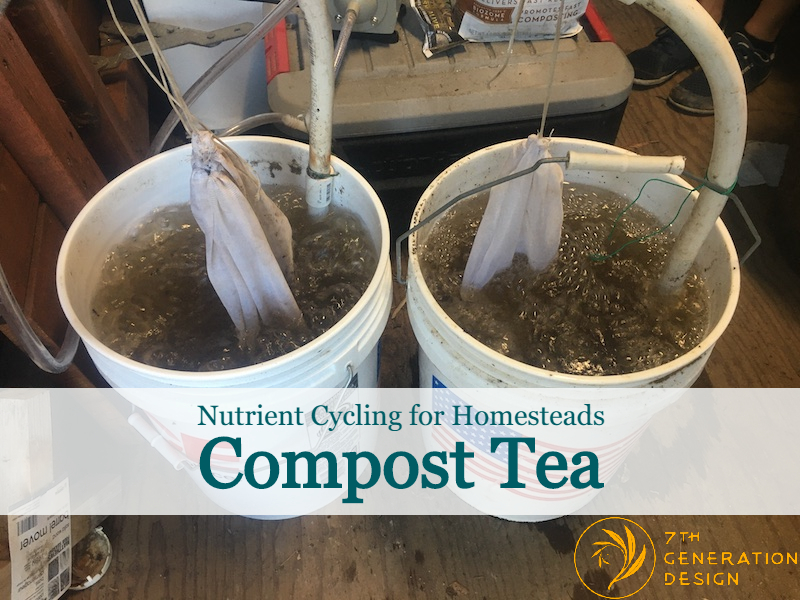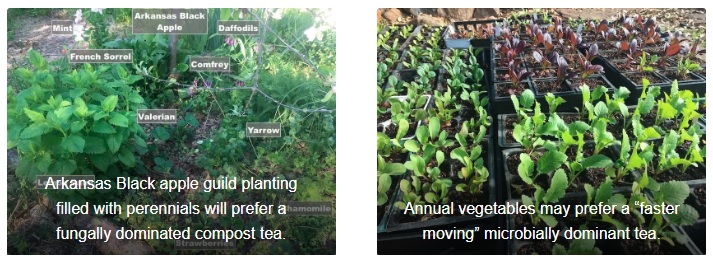
Another blog post in our Nutrient Cycling for Homesteads series - this time on
Compost Tea!
Brewing your own
compost tea is one of the lowest-hanging fruits available to any home gardener, homesteader or farmer to quickly and powerfully increase the vitality of the soil food web and the trees and plants that grow amongst it. Brewing setups can be scaled to practically any usage level, and can be made on the cheap with simple materials or be complex and capable of producing precision mixes geared towards specialty crops and landscapes. Inputs can be obtained for free or made on your own with vermicompost (which we discussed in an
earlier post!), thermophilic compost, indigenous microorganisms (IMOs), foraged or farmed fungi, kelp and other plant extracts and more.
Here is an outline of the info covered in the
blog post.
Nutrient Cycling for the Homestead: Compost Tea

Compost tea is nutrient and microbe rich liquid that is aerobically brewed to maximize the number of beneficial microbes, fungi and bio-available nutrients for the soil food web and plants. Basically it’s an immune-boosting, growth-enhancing, nutrifying power drink for your garden!
The benefits of regular application of compost tea to any garden, orchard, food forest or otherwise preferred group of plants are innumerable. Below is a short list of known benefits, and we are still learning about more every year.
Aerobically brewed compost tea is an excellent way to grow your own beneficial microbes and fungi for application to your landscape. Instead of applying yards of imported compost to your garden every year, regular compost tea application can be just as, if not more, effective in boosting soil health and production yields simply by making sure that the biology in your soils is optimal.Compost tea is a great way to stretch valuable but typically limited amendments like worm castings, kelp extracts, mycorrhizal inoculants and finished compost itself. By brewing a tea in aerobic conditions for 12 – 48+ hours you can dramatically expand the number of beneficial microbiota in the mix – effectively making a beneficial probiotic tea that can be sprayed on plants or fed directly into the soil.Regular compost tea application to damaged or healing soil (i.e. every annuals-based garden) is one of the best ways to quickly build soil structure. Healthy soil structure increases resistance to wind erosion and enhances porosity to improve infiltration during heavy rain events (and thus minimize flooding and top soil loss). Better soil structure (a consequence of a diverse and healthy soil food web) increases drought resistance as well. A well-structured soil is able to hold onto more water for longer, thus enabling plants to weather tougher conditions than those in less healthy soils.Compost teas are known to improve yields (often quite dramatically) for both annuals and perennials. They help jump start and/or reinforce the soil food web (community of micro and macro-organisms) that makes for healthy plants having access to the nutrients they need when they need them – without the need for outside inputs!Compost tea application is known to improve plant immunity to various pests and diseases – again, simply by ensuring that necessary nutrients are available at the right time and in the right amounts to the plants.Compost teas reduce and ultimately eliminate the need for fertilizer application in concert with other soil-tending practices (like no-till gardening, polyculture, crop rotation etc). A strong soil life community, with a healthy dynamic balance between bacteria, fungi, protozoa and nematodes, will be able to supply all necessary nutrients to a growing plant without the need for external inputs.
Also covered in the blog post:
How does compost tea brewing workHow to remove or neutralize the microbe-killing chemicals present in tap waterThe various ways to use your compost tea at your homesteadStep-by-step guide to creating your own compost tea brewing setup

Compost Tea is yet another amazing technique to have as part of a homesteaders quiver. It’s easy to get started - so
check it out, and please make sure to leave a comment to let us know how compost tea has worked for you (if you’re already utilizing it), or share any questions you have!
With gratitude,
Wes and Casey

-----
The 7th Generation Design “Nutrient Cycling for Homesteads” series covers the many ways you can build fertility, create soil, cycle nutrients and take responsibility for “waste” streams on your property. These systems all integrate with one another to increase resilience, improve nutrition (for soil and humans) and save dollars. The posts are written from our own experience and are geared towards the DIYer, though options are provided for ready-to-go purchased systems as well. For more of our blog posts, or our free e-books "Resilient Property Design Essentials", check us out at the link below!












